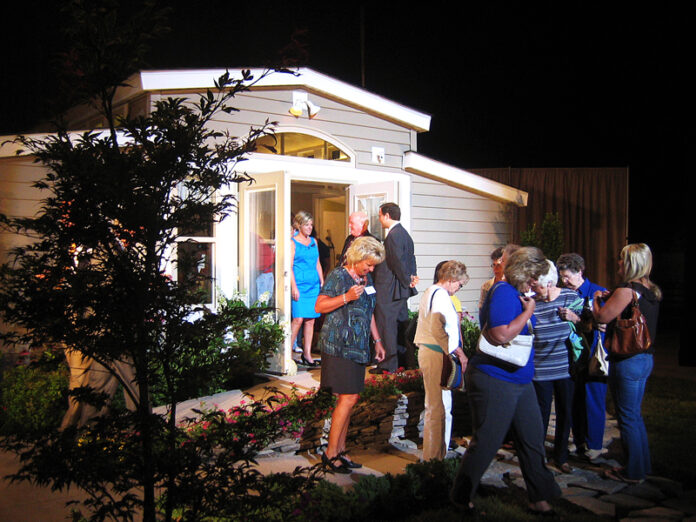N2Care, a local startup in Salem, aims to provide a “homespun” alternative to long-term care provided in nursing homes and hospitals by producing modular medical homes called “MedCottages” to families. They debuted their prototype to a crowd of over 150 people at the Roanoke Civic Center Coliseum earlier this week.
Founder and CEO Rev. Kenneth Dupin started off the ceremony by relating his desire for home-care during his own childhood and early adulthood medical issues. Whether it was tubes in his ears, tonsil removal or open-heart surgery, he stated that his thoughts were “I want someone to take me home and take care of me.” This constant refrain, along with his Ph. D studies in management that took him to Japan and Central America, where he saw more hands-on home care from families, was the genesis of the MedCottage idea.
“[The aged] were almost always revered,” he said on Monday in regard to elderly and ill family members he observed. Dupin noted a disparity between this attitude and the long-term care prevalent in the U.S. – and how he thinks that needs to change: “We have 78,000,000 Baby Boomers. This is going to force us to deal with this as a culture.”
The 12-by-24-foot MEDCottage, which could be leased for $2,000 a month, is equipped with vital signs monitors, video links and air filters/pressurizers to keep out contaminants. Remote control of doors and cameras would be available to caregivers, while a computer could notify the occupant to take their medicine. Sensors and a “foot sweep” camera would indicate if an occupant falls, while allowing them privacy.
When the concept of the MEDCottage began to take shape 5 to 6 years ago Virginia law did not allow for a second structure of this nature on a family’s property. Del. Morgan Griffith (R-Salem), after being approached by Dupin, sponsored Bill HB 1307, which “provides that zoning ordinances for all purposes shall consider temporary family healthcare structures…permitted accessory use in any single-family residential zoning district” only if occupied by a relative that is physically or mentally impaired.
The bill was signed into law by Gov. Bob McDonnell on April 14. Cutting the ribbon on a prototype at the Civic Center, Griffith said that he supported the MedCottage product because it “does two things: gives us better health care and creates jobs.”
The jobs, when planned production begins in early 2011, would mainly go to Virginia companies. Manufacturing of the homes will take place in Charlotte County; Richmond-based Tridium and Sleepsafe Beds in Rocky Mount are also part of the venture.
MEDCottage Director of Development Michelle Elegy estimates that 100 new jobs would be created directly in manafacturing during the first year of production. COO Susan Conn pointed out that related jobs in shipping and materials could follow. Before this can be done, though, 3 to 5 million dollars in investment is needed to bring the MEDCottage to full production.
Hospitals and assisted-living facilities may need extra room and the modular nature of the MedCottage, Conn says, could serve as a “solution to an overstressed system” while generating health care jobs. Representatives from Richfield Retirement Community and Good Samaritan Hospice were in attendance at the unveiling ceremony, indicating an interest from local care providers.
Development has also been a regional effort, with backing coming from the Virginia Tech Corporate Research Center and input from Professor Janis Terpenny, from the College of Engineering at Virginia Tech, who consulted on the plans for the prototype using experience on previous projects in assistive technology.
Noting that part of her position at Tech is to “make the human connection for engineering students,” Terpenny’s drive to assist N2Care in the MedCottage project partially stems from her own experience as she cared for her son Jason, who succumbed to leukemia at age 11. They spent many hours separated from the rest of the family as he recovered from chemotherapy in the hospital and Terpenny believes that a home-care structure such as the MedCottage would have, “made life much easier.” The more sterile environment could have prevented more infections as well, she believes.
Above all, Dupin says the MedCottage venture is based on easing the burden that families have to bear to take care of their loved ones: “It’s our job . . . sacrifice isn’t afraid of a billion dollar deficit or co-pay. This isn’t about legislators or manafacturers . . . it’s about sacrifice.”
By Aaron Layman [email protected]


Please send me info on the construction of these modular homes.
Excellent topics. I really like this. After long searching I found this online that, TheCaringSpace is your nationwide connection for finding elder in-home care and health services – find carefully screened senior home caregivers in your area today! Senior and in home caregivers, find a family or job today!
My mother wants to move down to SC with me but doesn”t want to live in my home and doesn”t want to be in a nursing home. She wants one of her kids to care for her: she’s 83 and having a hard time moving around and forgets things. How can I look into something similar with less cost to put on my property? It sounds like a great idea and with the soaring cost of nursing homes I want to know about alternatives for me as a caregiver.
Nice concept, the medical helthcare moved to the crowd. Modular construction is cost effective on investiment, the project owner could quickly have return on business. So, $2000 per month is quite reasonable price.
http://www.lifesbox.com – custom modular building manufacturer, Thailand